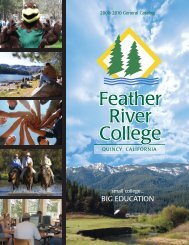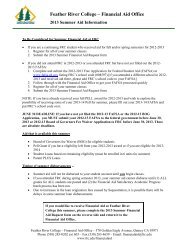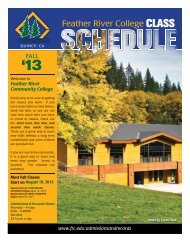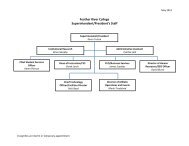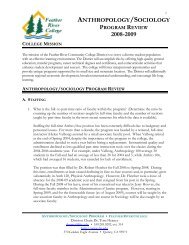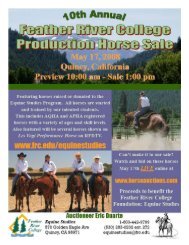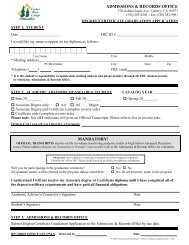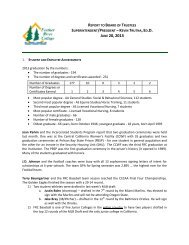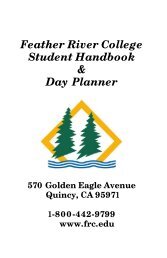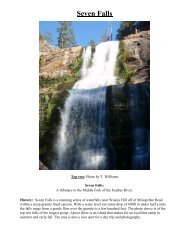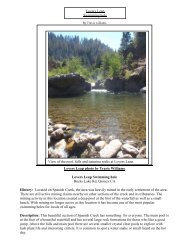2012 Catalog PDF - Feather River College
2012 Catalog PDF - Feather River College
2012 Catalog PDF - Feather River College
Create successful ePaper yourself
Turn your PDF publications into a flip-book with our unique Google optimized e-Paper software.
Academic xxxxxxx Majors<br />
Elective List 3 (choose from these general education courses to round out your area of emphasis in biology)<br />
ANTH 120 Physical Anthropology 4<br />
BIOL 164 Introduction to Animal Behavior 3<br />
ENVR 101 Introduction to Forestry/Cross-listed with FORS 101 4<br />
ENVR 150 Ecosystem Inventory and Measurements 2<br />
ENVR 160 Watershed Protection and Restoration 3<br />
ENVR 210 Introduction to Soil Science 3<br />
ENVR 250 Fisheries Culture 3<br />
FORS 101 Introduction to Forestry/Cross-listed with ENVR 101 4<br />
GEOG 104 Physical Geography 3<br />
GEOL 102 Physical Geology 3<br />
HES 133 Introduction to Kinesiology 3<br />
HES 170 Introduction to Nutrition/Cross-listed with NCA 170 3<br />
NCA 170 Introduction to Nutrition/Cross-listed with HES 170 3<br />
WILD 221 Wildlife Diversity and Field Techniques 4<br />
Total Major Requirements.....................................................................................................................27-28<br />
To earn an Associate in Science in Biology:<br />
1) Complete Major Core Requirements as outlined above.<br />
2) Complete FRC General Education requirements.<br />
3) Complete additional elective units from elective lists 1-3 so that major units, plus GE units, plus elective units<br />
total sixty (60) units or higher.<br />
Student Learning Outcomes:<br />
• Students will be able to apply the<br />
biological concepts of structure and<br />
function, organization, cellular processes,<br />
genetics, as well as ecology and evolution<br />
at all levels (molecular, cellular and<br />
organismal) and across the lineages of<br />
the Tree of Life.<br />
• Students will be able to compare and<br />
contrast features of living systems with<br />
respect to their common evolutionary<br />
origin as well as with respect to<br />
evolutionary differences.<br />
• Students will gain a fundamental<br />
understanding of how to apply the<br />
Scientific Method of investigation to<br />
hypothesis generation, testing, analysis<br />
and communication, and develop basic<br />
laboratory and field skills<br />
87





